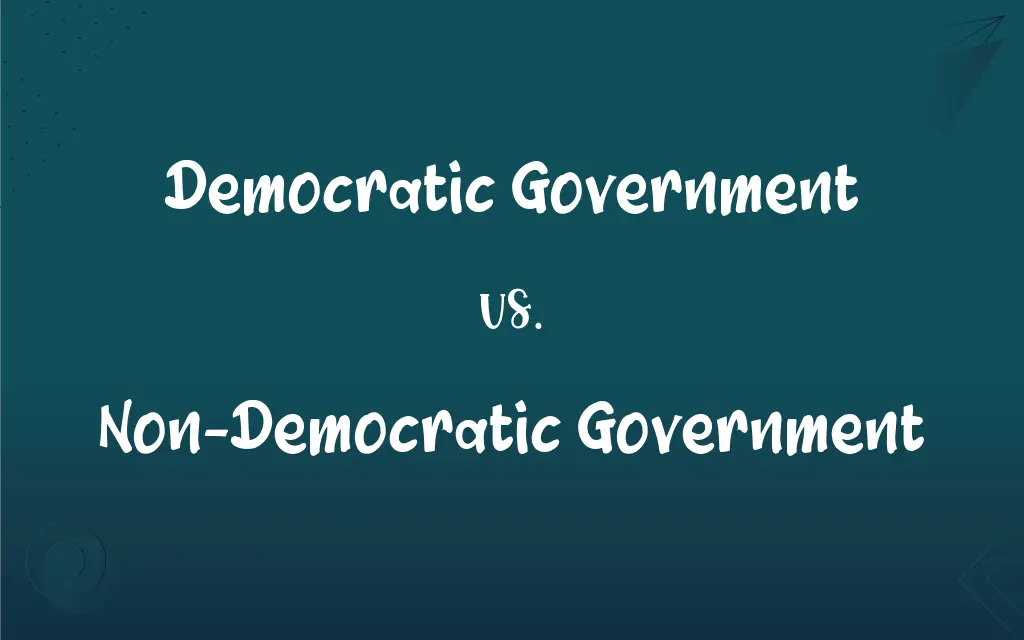Democratic Government vs. Non-Democratic Government: What's the Difference?
Edited by Aimie Carlson || By Harlon Moss || Updated on October 25, 2023
A democratic government derives its power from the people and ensures their participation in governance, while a non-democratic government lacks such public involvement, often concentrating power in few hands.

Key Differences
A democratic government is rooted in the principle that authority comes from the people. In such systems, citizens have the right to vote, express their views, and participate in the decision-making process. A non-democratic government, on the other hand, may deny or limit these rights, concentrating authority in a select group or individual.
Transparency and accountability are hallmarks of a democratic government. Through free press and open dialogue, leaders in a democratic system are answerable to the public. Conversely, a non-democratic government might suppress information, curtail press freedom, and operate without public scrutiny.
In a democratic government, the rule of law is paramount. Every individual, irrespective of their status, is equal in the eyes of the law. In contrast, in a non-democratic government, laws may be arbitrary, and justice could be dispensed based on the whims of those in power.
A democratic government often promotes pluralism, ensuring that multiple voices, perspectives, and parties have representation. A non-democratic government, however, might suppress opposition, stifle dissent, and uphold a single ideology or interest.
While a democratic government typically guarantees fundamental human rights, a non-democratic government might limit or infringe upon these rights, controlling aspects of citizens' lives to maintain its grip on power.
ADVERTISEMENT
Comparison Chart
Source of Power
From the people
Concentrated in few hands or an individual
Transparency
High, with public scrutiny
Limited or absent
Rule of Law
Uniform for all
May be arbitrary or biased
Pluralism
Promoted
Often suppressed
Human Rights
Typically upheld
May be limited or infringed
ADVERTISEMENT
Democratic Government and Non-Democratic Government Definitions
Democratic Government
A regime promoting pluralism and diverse views.
Multiple parties can contest elections in a democratic government.
Non-Democratic Government
A government that may restrict certain human rights.
Freedom of assembly might be curtailed in a non-democratic government.
Democratic Government
A system where leaders are accountable to the public.
Through free press in a democratic government, leaders' actions are scrutinized.
Non-Democratic Government
A regime where opposition or dissent is suppressed.
Political opponents might face persecution in a non-democratic government.
Democratic Government
A government where power is derived from the citizens.
In a democratic government, voting is a fundamental right of the people.
Non-Democratic Government
A government operating without extensive public participation.
Decision-making in a non-democratic government often excludes common citizens.
Democratic Government
A government that guarantees fundamental human rights.
Freedom of speech is often protected under a democratic government.
Non-Democratic Government
A regime where power isn't derived from the general populace.
In a non-democratic government, leaders might not be elected by the people.
Democratic Government
A government operating with transparency and openness.
Citizens have access to information under a democratic government.
Non-Democratic Government
A system where public accountability is limited or absent.
Citizens might lack mechanisms to challenge a non-democratic government's decisions.
FAQs
Is free press guaranteed in a democratic government?
Typically, yes. A free press is a pillar of most democratic societies.
Can a non-democratic government have popular support?
Yes, some non-democratic governments might have significant public backing.
Are elections exclusive to democratic government?
No, but in a democratic government, elections are free, fair, and frequent.
Can a non-democratic government promote economic growth?
Yes, governance type and economic growth aren't always directly correlated.
Do democratic governments ensure economic equality?
Not always. Economic disparities can exist in both democratic and non-democratic states.
Are democratic governments free from corruption?
No, corruption can exist in any government type.
Can non-democratic governments be stable?
Some non-democratic regimes might have prolonged stability, but it varies.
How does public policy differ in non-democratic governments?
Policy in non-democratic regimes might be top-down with limited public input.
Can there be censorship in a non-democratic government?
Often, yes. Many non-democratic regimes control or suppress information.
Is public protest allowed in democratic governments?
Generally, yes. Protests are a form of expression in many democracies.
Is judiciary independent in democratic governments?
Ideally, yes. An independent judiciary is crucial for democratic functioning.
Can human rights be upheld in a non-democratic government?
While less common, some non-democratic regimes might respect certain rights.
Can non-democratic governments change into democratic ones?
Yes, political transitions can occur based on various factors.
Are there global indices ranking democratic governments?
Yes, organizations like Freedom House and The Economist provide such rankings.
Can non-democratic governments have legal opposition?
It varies. Some might allow controlled opposition, while others suppress all dissent.
Are civil liberties guaranteed in democratic governments?
Typically, yes. Civil liberties are often enshrined in democratic constitutions.
Can non-democratic governments be internationally recognized?
Yes, international recognition isn't solely based on governance type.
What's a primary feature of a democratic government?
A democratic government ensures citizens' participation in decision-making.
Is rule of law absent in a non-democratic government?
Not necessarily, but it might be applied selectively or arbitrarily.
Are all monarchies non-democratic governments?
No, some monarchies are constitutional with democratic features.
About Author
Written by
Harlon MossHarlon is a seasoned quality moderator and accomplished content writer for Difference Wiki. An alumnus of the prestigious University of California, he earned his degree in Computer Science. Leveraging his academic background, Harlon brings a meticulous and informed perspective to his work, ensuring content accuracy and excellence.
Edited by
Aimie CarlsonAimie Carlson, holding a master's degree in English literature, is a fervent English language enthusiast. She lends her writing talents to Difference Wiki, a prominent website that specializes in comparisons, offering readers insightful analyses that both captivate and inform.































































